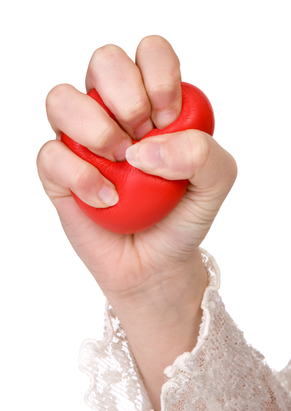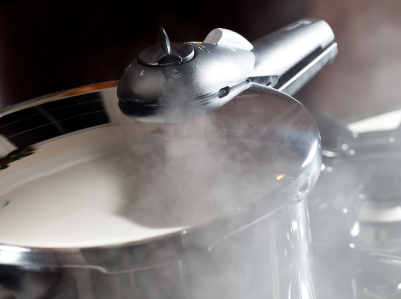Be still my heart: stress, women and heart disease
Heart disease. I have been writing about it for years. And the news doesn’t get much better. According to the American Heart Association, heart disease kills approximately one woman every minute. More importantly, despite the great strides that have been made on the research, treatment and even education fronts, 90% of women in the U.S. have at least one risk factor for heart disease. Yikes!
Allow me to share one of the greatest risk factors, one that you might not be aware of:
Mental stress.
If you are a regular reader of Flashfree, you know that stress can affect mood, sexual desire and symptoms of menopause. And not surprisingly, the association between mental stress and heart disease is well established. However, new study findings published online in the Journal of the American College of Cardiology suggest that mental stress might actually take a greater toll on women’s hearts than on men’s.
In the study (which had originally been designed to assess the impact of an antidepressant on stress-induced heart issues,)male and female participants were exposed to mental stress exercises, including one designed to induce anger. The researchers also evaluated factors that would indicate how the well or poorly the heart was functioning in relation to stress including blood pressure and heart rate as well as reduction in blood flow. Mind you, of the 310 people participating in the study, only 54 were women and this small sample does create certain limitations when it comes to interpreting the findings. However, the report shows that during times of stress, 57% of these women experienced reduced blood flow to their hearts, versus 41% of men. This is not to say that the men dodged the bullet; indeed, men had greater increases in traditional measures such as blood pressure.
Another important finding was the impact of mental stress; women tended to express more negative emotions and experienced a decline in the positive. And, the researchers say that they also observed differences in how the platelets behaved. In the bloodstream, platelets are responsible for stopping bleeding and in aid in clotting. However, they can also clump together to block the flow of blood when the vessels are damaged. In response to mental stress, not only did the blood platelets react more strongly and clump to a greater extent in women than in men, but the women had roughly twice the odds of this occurring.
The researchers say that the findings highlight gender differences in heart disease risk but also suggest that available risk prediction tools may fall short; this is because they don’t measure the full spectrum of mental-stress induced physical and psychological changes. What immediately comes to mind is the recent app launched by the North American Menopause Society, which in addition to promising a more seamless exchange of information and resources between provider and patient, also offers access to cardiovascular risk assessment. That aside, it’s definitely time to change the paradigm. Recent data suggest that death rates from heart disease in women have declined BUT the number has exceeded that of men for the past 20 years. By teasing out the why and what, there may be an avenue to change the narrative. Today, that avenue is mental stress.
The key message is to to be mindful of stress before it stills your heart and steals your life.
Read MoreNewsflash! Got Burnout? Work Stress May Not Paint the Entire Picture
Lord knows, many of us reach that point in our work lives where we simply feel burned out! It’s the underlying reason for underperformance, the reason why we choose to walk away, the cause of stress and unhappiness. I often find myself wondering if there any new information that can help to paint another brushstroke and illuminate the reasons why we feel the way that we do when we reach that peak.
Importantly, according to new research out of the University of Montreal, wellbeing at work can be affected by factors that lay outside the work environment. Mind you, this is not to say that deadlines, relentless demands, abusive colleagues and endless overtime don’t contribute, but findings suggest that these factors are not the sole reasons for psychological distress, depression and emotional exhaustion that provide the framework for the condition that we call burnout.
The researchers explain that workers’ mental health is multifaceted and reliant upon the broader social environment with which they interact on a daily basis. Although these interactions may be sources of wellbeing and pleasure, they can also affect so-called ‘psychic balance’ in more negative ways. In fact, when almost 2,000 employees from 63 different Canadian organizations were surveyed about their mental health, workplace, family and social networks, it appeared that the interaction of workplace stress and daily personal stressors played a key role. Moreover, in so far as work was specifically concerned, factors like decision authority, proper utilization of skills in a job and demands/social support from colleagues had only a small impact on characteristics of burnout when compared across different work scenarios. And, any variation appeared to level out when the researchers started to account for outside factors such as family and social networks, marital status, household income and social support from friends.
The workers who had greater stability outside of the work environment — being in a relationship, having higher household income and experiencing less work-family conflicts and greater access to positive support networks — were found to exhibit fewer mental health symptoms. Conversely, factors such as stressful marital and parental relationships tended to boost the mental distress quotient. The work/family conflicts, e.g. having to delay family time for work or having family impact work ability, coupled with relationship stress may have influenced distress the most.
However, questions remain. While researchers may be closer to identifying the cause of work related burnout and how organizational and external factors interact to create the perfect storm, it’s less clear the types of steps inside the workplace that can be taken to minimize the intersection of these factors. In the interim, perhaps it’s time for workers to focus on/take stock of outside forces; by maximizing how content they are with their lives and life quality, they may find that work becomes more pleasurable and easier.
Read More
Aromatherapy and menopausal symptoms; what’s the 4-11 on neroli oil?
[Photo credit: Los Angeles Arboretum]
Stress. Lord only knows that it wreaks havoc on our bodies and on our moods. And when it’s exacerbated by the tide of hormones that wax and wane over menopause, it can take an enormous toll. Importantly, the essential oil of the bitter orange tree (Citrus aurantium L. var amara), better known as neroli oil, has been shown in animal laboratory studies to reduce anxiety and depression. However, does it work in humans as well?
In a study published in Evidence-Based Complimentary and Alternative Medicine journal, researchers assessed if inhaled 0.1% or 0.5% neroli oil might relieve the psychological symptoms of menopause, i.e. stress, depression and anxiety. While the study included less than 100 women, it was a scientifically controlled trial and the women, all of whom were in menopause, healthy, and not using meds for their mental health were randomized to neroli oil dissolved in almond oil or to almond oil only.. They were asked to inhale either preparation for 5 minutes twice a day for five days. Measures of sexual desire, stress, quality of life, blood pressure and pulse rate and blood serum and estrogen were taken at the start of the study and the day after.
Interestingly, inhaling neroli oil significantly improved physical menopausal quality of life scores compared to inhaling the almond-only oil. The 0.1% formulation also had a significant effect on vasomotor symptom scores. While stress levels were shown to decline in all three groups, the differences were not scientifically significant. And while the neroli oil did help to improve cortisol levels, it had no effect on estrogen. However, it did appear to significantly reduce blood pressure.
Aromatherapy is a practice that is not taken very seriously among medical practitioners yet it’s important to note that neroli oil interacts with the very same neurotransmitters that play a role in regulating body temperature (i.e. the 5-HT receptors). Hence, it is not surprising that in this study, the 0.1% dose significantly improved vasomotor symptoms, Moreover, while the neroli oil did not appear to reduce stress, it did have a positive, significant impact on blood pressure measures, which indicates a role in relieving the body’s cardiovascular responses to stress. The researchers say that neroli oil’s influence on blood pressure might be due to how it interacts with the autonomic nervous system, which among many functions, controls heart rate and breathing.
While neroli oil can have side effects when it is ingested, I have been unable to find similar reports when a small amount (i.e. two drops) is rubbed on the skin and then used as aromatherapy. Nevertheless, you should speak with a licensed, knowledgable practitioner before trying this strategy as people as rubbing it on the skin may cause allergic reactions and does risk that some of it will be absorbed, thereby causing a drug reaction. Most importantly, one study does not proof make. Be vigilant and let’s see if there are other reports in greater numbers of women.
Read MoreIs daily stress adding to weight gain?
 According to a newly published online study, stress may be wreaking more than havoc on our bodies than previously reported. And, it’s quantifiable…at least with regard to weight gain.
According to a newly published online study, stress may be wreaking more than havoc on our bodies than previously reported. And, it’s quantifiable…at least with regard to weight gain.
I have certainly covered the impact of daily stressors on the hormone cortisol (think: craving comfort food, higher insulin levels and a midsection fat dump). However, study findings demonstrate that if women experience one or more stressful events the day before eating a fat-laden meal, it may slow the metabolism in such a way that over time leads to a whopping 11 extra pounds a year! Is prevention the best cure? Here’s what you need to know.
A bit of background…In this study, researchers asked fifty eight women to sample two separate calorie and fat dense meals consisting of eggs, turkey sausage, biscuits and gravy (940 calories, 60 g fat total, with the difference between the two meals saturated versus monounsaturated fats). To level the playing field and neutralize any possible factors that could affect the results, they were asked to forgo physical activity and alcohol, as well as vitamins and antioxidants in days leading up the study; they also fasted 12 hours after consuming three, standardized meals. On the day of the study visit, they completed several questionnaires assessing depression, physical activities and the degree of stress during the day before. Most of the stressors that the women reported were fairly common and interpersonal, for example arguments with colleagues or spouses, disagreements with close ones or work issues.
What they found….the more stressors that women reported having had experienced the day prior to the meal, the slower the metabolic rate and the higher the insulin levels following the fatty meal. (Metabolic rate refers to the amount of time required to burn calories and fat; insulin contributes to the way fat is stored.) More stress also meant less conversion of fat into fuel, meaning that these women were storing more fat. What’s more, the combination of depression history and a large number of stressors caused both an immediate spike in triglycerides following the high fat calorie meal and a two-fold slower decline in cortisol levels. Additionally, type of fat didn’t appear to influence these findings; regardless if it was saturated or monounsaturated, stress affected metabolism fairly equally.
One of the most interesting take-aways from the study is that the high -at, calorie-dense meals that the women consumed are equivalent to many common fast food choices, for example, a MacDonald’s Big Mac with cheese and medium fries provides 930 calories and 58 grams of fat. And, the researchers note that while most people eat every four to five hours, the women were only provided with one meal; this means that food choices appear to influence metabolic rates all day long. Yet another reason to keep healthy foods nearby when stressors hit.
Read MoreThe present of being present: cortisol and mindfulness meditation
Sometimes things are just timely. Like this post, which I am bringing back today for your consideration.
Happy Friday, folks! Wishing you a stress free weekend!
It seems that I write about stress a lot on FlashFree. Perhaps that is because like many, my life — namely my work — can be very stressful from time to time. However, according to the American Psychological Association, I’m not alone; most Americans suffer from moderate to high stress and the problem does not appear to be going away. Moreover? Work issues are the primary stressors in 77% of people.
From a midlife perspective, stress and its related hormone, cortisol, can cause a lot of health-related problems. In fact, not only does cortisol promote a fat dump in the midsection, but experts say that overexposure to cortisol and other stress hormones has a cumulative affect, leading to heart disease, sleep issues, digestive issues, obesity, depression and worsening of skin conditions. It’s critical to counter stress’ negative effects before they take their toll and start to do permanent damage. One important strategy to achieve a better balance is meditation.
Fortunately, a team of researchers at UC Davis’ Center for Mind and Brain are devoting time to studying psychological and physiological processes in order to explain the benefits of meditation. The framework for this effort is the Shamatha Project, which is apparently the most comprehensive meditation study ever undertaken. Most importantly, this scientific twist on a centuries old practice may ultimately elevate meditation’s place in Western medicine.
To better understand the effects of meditation on stress, the research team recently took 60 people (between the ages of 22 and 69) who had some prior experience with meditation, measured cortisol and body mass index and their current degree of ‘mindfulness,*’ and then randomly assigned them to a three month meditation retreat or a waiting list. Those on the waiting list participated in the same, three-month retreat at a later date. (*Participants completed a mindfulness questionnaire that measured the degree that these people directed their cognitive resources to sensory experiences and how often they drifted, as well as their ability to let go of distressing thoughts.)
At the retreat, the group met two times a day for one hour, guided sessions and the rest of the time (around 6 hours) practiced solo meditation in 20 to 30 minute increments. Meditation practices were focused on mindful breathing and relaxation and promoted compassion and kindness toward others. Overall, the emphasis was on present awareness rather than meandering into the future of ‘what if’s.’ During the middle of the retreat, all were encouraged to enter into silence for a period of about four weeks. Aside from scheduled meals and group meditations, everyone was on their own to decide sole meditation, exercise and free time.
Did learning how to direct and focus attention away from uncontrolled, ruminating thoughts and worry and toward a chosen target reduce cortisol levels? The researchers say that they found a correlation between a high score for mindfulness and a low score in cortisol, both before and after the retreat. The results were greatest for participants who were able to achieve the greatest increases in mindfulness, that is, the more that they reported directing their thoughts to the present/immediate experience, the lower their resting cortisol levels were. Participants also experienced large improvements in overall wellbeing, daily mood and emotional functioning.
While the findings do not prove cause and effect, they do suggest that changing the mind paradigm to focus on the now rather than the future may ultimately help to reduce our tendency to think about the past or worry about the future and in turn, counter excessive cortisol release.
Tonya Jacobs, a postdoctoral researcher and the study’s lead author, explains that “the idea that we can train our minds in a way that fosters healthy mental habits and that these habits may be reflected in mind-body relations is not news; it’s been around for centuries. But, accumulating evidence might help the idea — that the present is the best present we can give ourselves — be better integrated into Western mentalities and health practices.
Mindful meditation may ultimately prove to be one of our strongest defenses against stress and its companion, cortisol!
Read MoreWednesday Bubble Recap: Today’s Stress, Tomorrow’s Disability
Some of you may have noticed that I’ve been gone from Flashfree for a week now. I was attempting to take a staycation. Unfortunately, that attempt fell short of expectations. Sure, I didn’t turn off like I promised myself that I would. However, when the train leaves the station without a schedule, sometimes you simply have to hop on. And hence, I found myself hopping on at odd stops other than finding a path of true avoidance. And it’s left me feeling one way: stressed.
I was hoping to hop back on the Flashfree wagon full steam today with some interesting novel twist on the ‘pause but rather, I decided to repost this piece from earlier in the year. It can be hard to shut life down at times but the ramifications are pretty clear.
I’m planning on taking a day or two to remind myself. What about you? What’s your stress quotient like? If it’s out of control like mine and you are finding yourself barely coping at times, it’s probably an excellent call to step back and just stop. At the end of the day, the long term effects are more important than the short term reasons for the stress.
Mental stress takes its toll in so many ways; from depression and mental exhaustion to memory issues, sleep disruption, and reduced quality of life, to heart disease, diabetes and possibly musculoskeletal disease, stress literally sucks the life out of an individual. What’s more, while stress may’ take no prisoners,’ but its effects are not uniform and actually vary from person to person. As I’ve written previously, factors such as active coping and attitude are as important as a lack of control over one’s work environment. However, what about long-term consequences? According to a recent paper published online in the Journal of Gerontology, little has been written about the long-term consequences of mental stress and its toll as we grow older. And, the few studies that have examined it have actually been relatively short.
Fortunately, that paradigm has changed, In fact, when researchers examined the association between self-perceived stress and its later toll in roughly 5,500 men and women, the picture they found was not pretty. Stress symptoms were first evaluated when participants were between the ages of 45 and 58 and then reexamined four years later. They included factors such as stomach or chest pain, dizziness, anxiety, lack of enjoyment, sleep issues, lack of energy and a gloomy outlook, which were rated by frequency. Twenty-eight years later, daily living scales were used to assess the degree of disability in the same individuals; these included the ability to feed oneself, to dress, to get out of bed, prepare meals, shop, do laundry or do housework.
As mentioned, stress was inconsistent among the participants; some were profiled as having mostly negative reactions to work and depressiveness while others perceived a decline in their ability to focus and think. Some participants primarily reported sleep disturbances or physical symptoms such as chest pain, stomach ache and dizziness. Only a third reported having no stress symptoms in midlife, whereas up to a quarter reported that their stress was constant. Most importantly, constant stress in midlife was linked to significant challenges in performing the most basic of activities later in life — up to four times worse. Even more troubling? Constant stress was a deal breaker when it came to physical activity; these people had up to three times greater risk for not being able to walk a mere 1.2 miles!
Researchers say that it’s likely that “constant activation of stress responses lead to ‘wear and tear.” And while the health trajectory that leads from stress to disability is still unclear, what is clear is the need to intervene in midlife, take time to identify work stressors, change workloads and tasks, engage in regular physical activity and seek counseling if stress symptoms continue to interfere with life quality.
You only live in this body once; be sure to take care of it at all stages before lack of care takes a real toll.
Read More











